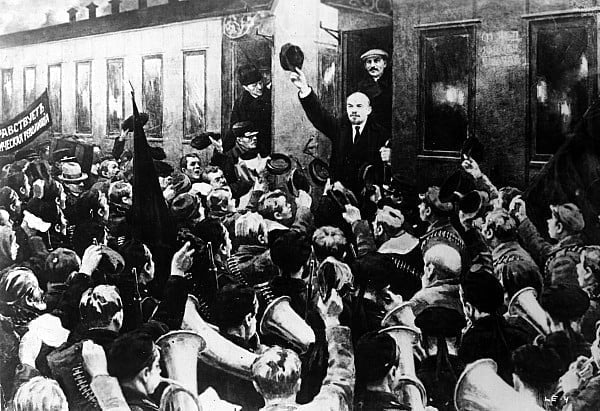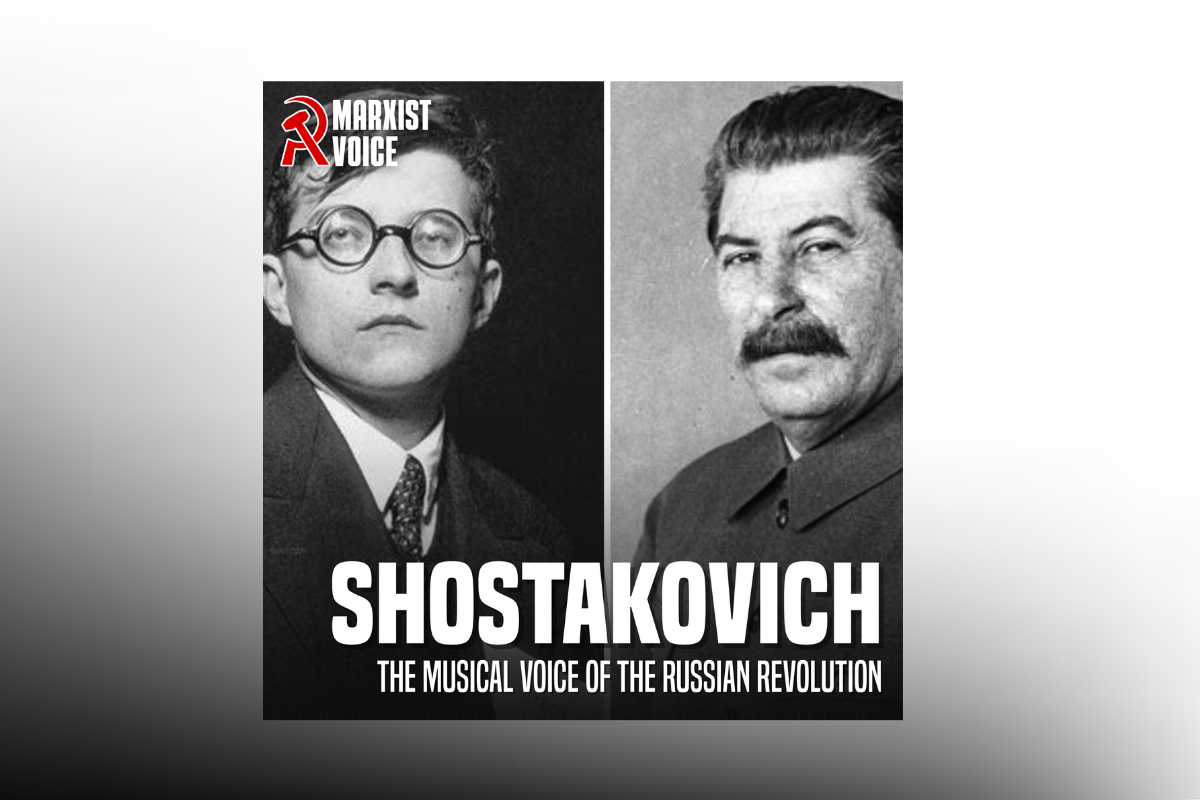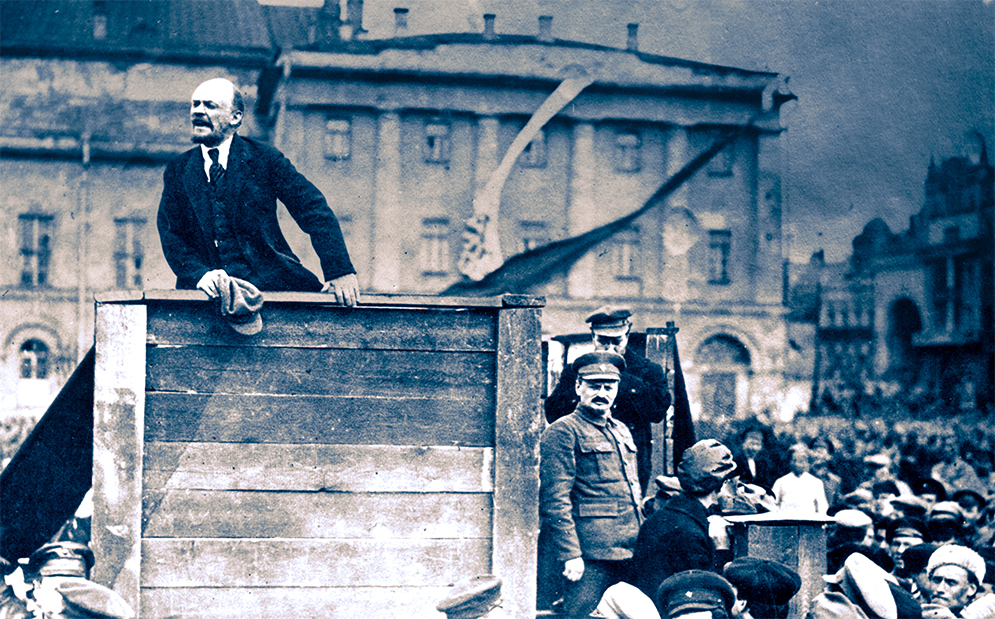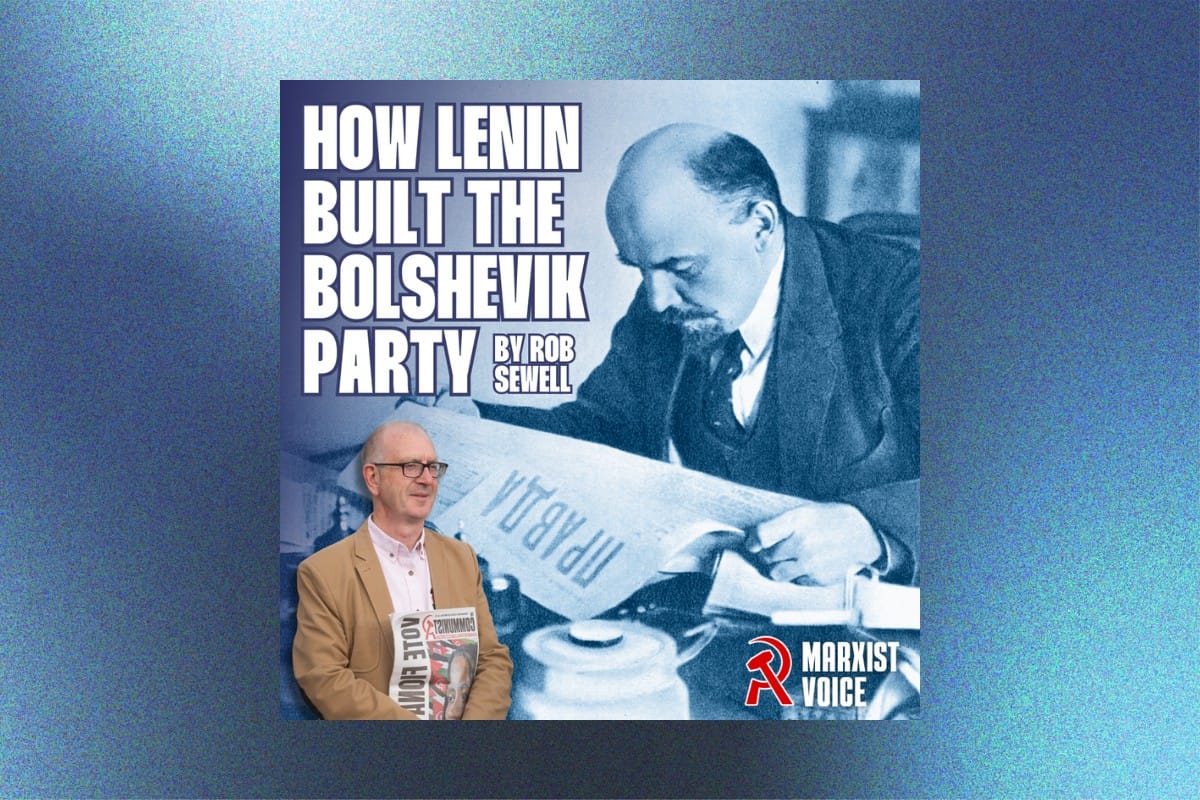In the following extract from his History of the Russian Revolution, Leon Trotsky outlines how the Bolsheviks were rearmed politically and the pivotal role that Lenin played with his famous April Theses.
[All dates cited by Trotsky are in the old Julian calendar]
How [best] explain Lenin’s extraordinary isolation at the beginning of April? How in general could such a situation arise, and how was the rearming of the Bolshevik staff accomplished?
From the year 1905 the Bolshevik Party had waged a struggle against the autocracy under the slogan “Democratic Dictatorship of the Proletariat and the Peasantry.” This slogan as well as its theoretical background, derives from Lenin. In opposition to the Mensheviks, whose theoretician, Plekhanov, stubbornly opposed the “mistaken idea of the possibility of accomplishing a bourgeois revolution without the bourgeoisie,” Lenin considered that the Russian bourgeoisie was already incapable of leading its own revolution. Only the proletariat and peasantry in close union could carry through a democratic revolution against the monarchy and the landlords. The victory of this union, according to Lenin, should inaugurate a democratic dictatorship, which was not only not identical with the dictatorship of the proletariat, but was in sharp contrast to it, for its problem was not the creation of a socialist society, nor even the creation of forms of transition to such a society, but merely a ruthless cleansing of the Augean stables of medievalism. The goal of the revolutionary struggle was fully described in three militant slogans: Democratic Republic, Confiscation of the Landed Estates, Eight-Hour Working Day – colloquially called the three whales of Bolshevism, by analogy with those whales upon which according to an old popular fable the earth reposes. […]
Dual power
The actual course of the February revolution disrupted this accustomed schema of Bolshevism. It is true that the revolution was accomplished by a union of the workers and peasants… But as a matter of fact, the February overturn led to a bourgeois government, in which the power of the possessing classes was limited by the not yet fully realised sovereignty of the workers’ and soldiers’ soviets. All the cards were mixed. Instead of a revolutionary dictatorship – i.e. the most concentrated power – there was established the flabby régime of the dual power, in which the feeble energy of the ruling classes was wasted in overcoming inner conflicts. Nobody had foreseen this régime. And indeed one cannot demand from a prognosis that it indicate not only the fundamental tendencies of development, but also accidental conjunctions. “Who ever made a great revolution knowing beforehand how to carry it through to the end?” asked Lenin later. “Where could you get such knowledge? It is not to be found in books. There are no such books. Our decisions could only be born out of the experience of the masses.” […]
The further development of the revolution must obviously proceed from new facts, not old schemas. Through their representatives the masses were drawn, partly against their will, partly without their consciousness, into the mechanics of the two power régime. They now had to pass through this in order to learn by experience that it could not give them either peace or land. To recoil from the two-power régime henceforward meant for the masses to break with the Social Revolutionaries and the Mensheviks. But it is quite evident that a political turning of the workers and soldiers toward the Bolsheviks, having knocked over the whole two-power construction, could now no longer mean anything but the establishment of a dictatorship of the proletariat resting upon a union of the workers and peasants. In case the popular mass had been defeated, only a military dictatorship of capital could have risen on the ruins of the Bolshevik Party. “The democratic dictatorship” was impossible in either case. In looking toward it, the Bolsheviks had actually to turn their faces toward a phantom of the past. It was in this position that Lenin found them when he arrived with his inflexible determination to bring the party out on a new road.
Lenin himself, to be sure, did not replace the formula of democratic dictatorship by any other formula, even conditional or hypothetical, until the very beginning of the February revolution. Was he correct in this? We think not. What happened in the party after the revolution revealed all too alarmingly the belatedness of that rearming – which moreover in the given situation no one but Lenin himself could have carried through. He had prepared himself for that. He had heated his steel white hot and re-tempered it in the fires of the war. In his eyes the general prospect of the historic process had changed; the shock of the war had sharply advanced the possible date of a socialist revolution in the West. While remaining for Lenin still democratic, the Russian revolution was to give the stimulus to a socialist revolution in Europe, which should then drag belated Russia into its whirlpool. Such was Lenin’s general conception when he left Zurich. […] In this sense, Lenin now first wrote that the Russian proletariat will begin the socialist revolution.
April Theses
Such was the connecting link between the old position of Bolshevism, which limited the revolution to democratic aims, and the new position which Lenin first presented to the party in his theses of April 4. This new prospect of an immediate transition to the dictatorship of the proletariat seemed completely unexpected, contradictory to tradition, and indeed simply would not fit into the mind. Here it is necessary to remember that up to the outbreak of the February revolution, and for a time after, Trotskyism did not mean the idea that it was impossible to build a socialist society within the national boundaries of Russia (which “possibility” was never expressed by anybody up to 1924 and hardly came into anybody’s head). Trotskyism meant the idea that the Russian proletariat might win the power in advance of the Western proletariat, and that in that case it could not confine itself within the limits of a democratic dictatorship but would be compelled to undertake the initial socialist measures. It is not surprising, then, that the April theses of Lenin were condemned as Trotskyist.
The counter-arguments of the old Bolsheviks developed along several lines. The principal quarrel was about the question whether the bourgeois-democratic revolution was finished. Inasmuch as the agrarian revolution was not yet complete, the opponents of Lenin justly asserted that the democratic revolution as a whole was not finished, and hence, they concluded, there is no place for a dictatorship of the proletariat, even though the social conditions of Russia render it possible in general at a more or less proximate date. It was in this way that the editors of Pravda posed the question […]. Later on, in the April conference, Kamenev repeated this: “Lenin is wrong when he says that the bourgeois democratic revolution is finished … The classical relics of feudalism, the landed estates, are not yet liquidated … The state is not transformed into a democratic society … It is early to say that the bourgeois democracy has exhausted all its possibilities.” […]
Lenin saw, of course, as clearly as his opponents that the democratic revolution was not finished, that, on the contrary without really beginning it had already begun to drop into the past. But from this very fact it resulted that only the rulers of a new class could carry it through to the end, and that this could be achieved no other way than by drawing the masses out from under the influence of the Mensheviks and Social Revolutionaries – that is to say, from the indirect influence of the liberal bourgeoisie. The connection of those parties with the workers, and especially with the soldiers, was based on the idea of defence – “defence of the country” or “defence of the revolution.” Lenin, therefore, demanded an irreconcilable opposition to all shades of social patriotism. Separate the party from the backward masses, in order afterwards to free those masses from their backwardness. “We must abandon the old Bolshevism,” he kept repeating. “We must make a sharp division between the line of the petty bourgeoisie and the wage worker.” […]
Economic backwardness
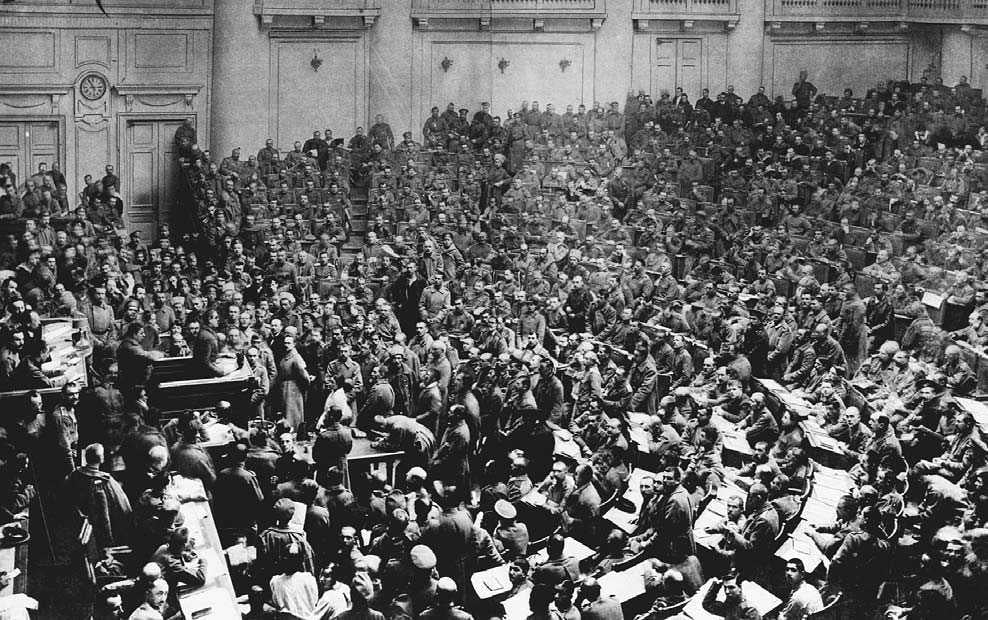 Another argument against Lenin was derived from the backwardness of Russia. A government of the working class inevitably means a transition to socialism, but economically and culturally Russia is not ripe for this. We must carry through the democratic revolution. Only a socialist revolution in the West can justify a dictatorship of the proletariat here. This was Rykov’s argument at the April conference. That the cultural-economic condition of Russia in itself was inadequate for the construction of a socialist society was mere ABC to Lenin. But societies are not so rational in building that the dates for proletarian dictatorships arrive exactly at that moment when the economic and cultural conditions are ripe for socialism. […] The fact that in a backward country like Russia the bourgeoisie had decayed before the complete victory of the bourgeois régime, and that there was nobody but the proletariat to replace it in the position of national leadership, was an expression of this in harmony. The economic backwardness of Russia does not relieve the working class of the obligation to fulfil its allotted task, but merely surrounds this task with extraordinary difficulties. To Rykov, who kept repeating that socialism must come from countries with a more developed industry, Lenin gave a simple but sufficient answer: “You can’t say who will begin and who finish.” […]
Another argument against Lenin was derived from the backwardness of Russia. A government of the working class inevitably means a transition to socialism, but economically and culturally Russia is not ripe for this. We must carry through the democratic revolution. Only a socialist revolution in the West can justify a dictatorship of the proletariat here. This was Rykov’s argument at the April conference. That the cultural-economic condition of Russia in itself was inadequate for the construction of a socialist society was mere ABC to Lenin. But societies are not so rational in building that the dates for proletarian dictatorships arrive exactly at that moment when the economic and cultural conditions are ripe for socialism. […] The fact that in a backward country like Russia the bourgeoisie had decayed before the complete victory of the bourgeois régime, and that there was nobody but the proletariat to replace it in the position of national leadership, was an expression of this in harmony. The economic backwardness of Russia does not relieve the working class of the obligation to fulfil its allotted task, but merely surrounds this task with extraordinary difficulties. To Rykov, who kept repeating that socialism must come from countries with a more developed industry, Lenin gave a simple but sufficient answer: “You can’t say who will begin and who finish.” […]
Lenin’s actual influence in the party was indubitably very great, but it was by no means unlimited. It was still subject to appeal even later, after October, when his authority had grown extraordinarily because the party had measured his power with the yardstick of world events. So much the more insufficient are these mere personal references to his authority in April 1917, when the whole ruling group of the party had already taken up a position contradictory to that of Lenin. […]
This April conflict between Lenin and the general staff of the party was not the only one of its kind. Throughout the whole history of Bolshevism, with the exception of some episodes which in essence only confirm the rule, all the leaders of the party at all the most important moments stood to the right of Lenin. This was not an accident. Lenin became the unqualified leader of the most revolutionary party in the world’s history, because his thought and will were really equal to the demands of the gigantic revolutionary possibilities of the country and the epoch. Others fell short by an inch or two, and often more.
The “Old Bolsheviks” – who pretentiously emphasised this appellation in April 1917 – were condemned to defeat because they were defending exactly that element of the party tradition which had not passed the historic test. “I belong to the old Bolshevik Leninists,” said Kalinin, for instance, at the Petrograd conference of April 14, “and I consider that the old Leninism has not by any means proved good-for-nothing in the present peculiar moment, and I am astonished at the declaration of Comrade Lenin that the old Bolsheviks have become an obstacle at the present moment.” Lenin had to listen to many such offended voices in those days. However, in breaking with the traditional formula of the party, Lenin did not in the least cease to be a “Leninist.” He threw off the worn-out shell of Bolshevism in order to summon its nucleus to a new life.
Against the old Bolsheviks Lenin found support in another layer of the party already tempered, but more fresh and more closely united with the masses. In the February revolution, as we know, the worker-Bolsheviks played the decisive role. They thought it self-evident that that class which had won the victory should seize the power. These same workers protested stormily against the course of Kamenev and Stalin, and the Vyborg district even threatened the “leaders” with expulsion from the party. The same thing was to be observed in the provinces. Almost everywhere there were left Bolsheviks accused of maximalism, even of anarchism. These worker-revolutionists only lacked the theoretical resources to defend their position. But they were ready to respond to the first clear call. It was on this stratum of workers, decisively risen to their feet during the upward years of 1912-14, that Lenin was now banking. Already at the beginning of the war, when the government dealt the party a heavy blow by arresting the Bolshevik faction of the Duma, Lenin, speaking of the further revolutionary work, had demanded the education by the party of “thousands of class conscious workers, from among whom in spite of all difficulties a new staff of leaders will arise.” […]
In his mind Lenin had been living through the events, along with these worker-Bolsheviks, making with them the necessary inferences – only broader and more boldly than they. In his struggle with the indecisiveness of the staff and the broad officer layer of the party, Lenin confidently relied on its under-officer layer which better reflected the rank-and-file worker-Bolshevik. […]
Once the Leninist formulas were issued, they shed a new light for the Bolsheviks upon the experience of the past months and of every new day. In the broad party mass a quick differentiation took place – leftward and leftward, – toward the theses of Lenin. District after district adhered to them,” says Zalezhsky, and by the time of the all-Russian party conference on April 24, the Petersburg organization as a whole was in favour of the theses”.
Sharp crisis
The struggle for the rearming of the Bolshevik ranks, begun on the evening of April 3, was essentially finished by the end of the month. The party conference, which met in Petrograd April 24-29, cast the balance of March, a month of opportunist vacillations, and of April, a month of sharp crisis. By that time the party had grown greatly, both quantitatively and in a political sense. The 149 delegates represented 79,000 party members, of whom 15,000 lived in Petrograd. For a party that had been illegal yesterday, and was today anti-patriotic, that was an impressive number, and Lenin several times called attention to it with satisfaction. The political physiognomy of the conference was immediately defined by the election of a presidium of five members. It did not include either Kamenev or Stalin, the chief culprits of the March misfortune.
Although for the party as a whole the debated questions were already firmly decided, many of the leaders, still clinging to the past, continued at this conference in opposition, or semi-opposition, to Lenin. Stalin remained silent and waited. Dzerzhinsky, in the name of “many,” who “did not agree in principle with the theses of the spokesman,” demanded that a dissenting report be heard from “the comrades who have along with us experienced the revolution in a practical way.” This was an evident thrust at the emigrant character of the Leninist theses. Kamenev did actually make a dissenting report in defence of the bourgeois democratic dictatorship. Rykov, Tomsky, Kalinin, tried to stand more or less by their March positions. Kalinin continued to advocate a coalition with the Mensheviks in the interests of the struggle with liberalism. The prominent Moscow party worker, Smidovich, hotly complained in his speech that “every time we speak they raise against us a certain bogey in the form of the theses of Comrade Lenin.” Earlier, when the Moscow members were voting for the resolutions of the Mensheviks, life had been a good deal more peaceful. […]
The abruptness of the turn in the policy of the party was obvious to all. Schmidt, a worker-Bolshevik, afterward People’s Commissar of Labour, said at the April conference: “Lenin gave a different direction to the character of the work.” According to Raskolnikov – writing, to be sure, several years later – Lenin in April 1917 “carried out an October revolution in the consciousness of the party leaders … The tactic of our party is not a single straight line, but makes after the arrival of Lenin a sharp jump to the left.” The old Bolshevik, Ludmila Stahl, more directly and also more accurately appraised the change. “All the comrades before the arrival of Lenin were wandering in the dark,” she said, at the city conference on the 14th of April. “We know only the formulas of 1905. Seeing the independent creative work of the people, we could not teach them … Our comrades could only limit themselves to getting ready for the Constituent Assembly by parliamentary means, and took no account of the possibility of going farther. In accepting the slogans of Lenin we are now doing what life itself suggests to us. We need not fear the Commune, and say that we already have a workers’ government; the Commune of Paris was not only a workers’, but also a petty bourgeois government.” It is possible to agree with Sukhanov that the rearming of the army “was the chief and fundamental victory of Lenin completed by the first days of May.” Sukhanov, it is true thought that Lenin in this operation substituted an anarchist for a Marxist weapon.
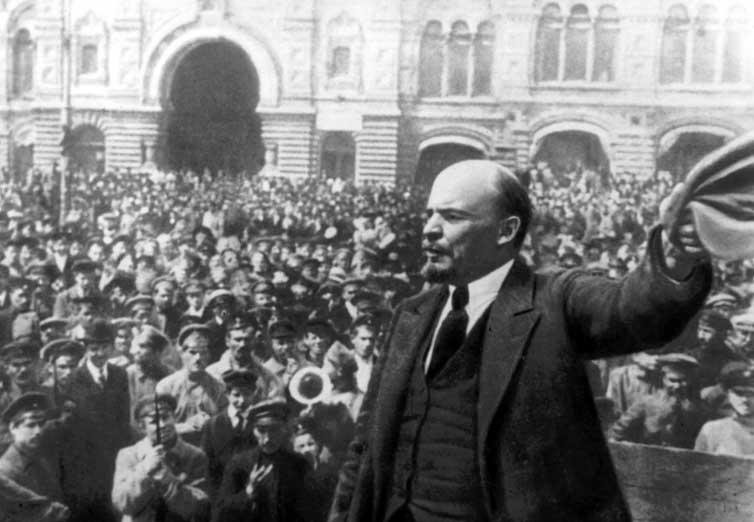
The role of Lenin
It remains to ask – and this is no unimportant question, although easier to ask than answer: How would the revolution have developed if Lenin had not reached Russia in April 1917? If our exposition demonstrates and proves anything at all, we hope it proves that Lenin was not a demiurge of the revolutionary process, that he merely entered into a chain of objective historic forces. But he was a great link in that chain. The dictatorship of the proletariat was to be inferred from the whole situation, but it had still to be established. It could not be established without a party. The party could fulfil its mission only after understanding it. For that Lenin was needed. Until his arrival, not one of the Bolshevik leaders dared to make a diagnosis of the revolution. The leadership of Kamenev and Stalin was tossed by the course of events to the right, to the Social Patriots: between Lenin and Menshevism the revolution left no place for intermediate positions. Inner struggle in the Bolshevik Party was absolutely unavoidable. Lenin’s arrival merely hastened the process. His personal influence shortened the crisis. Is it possible, however, to say confidently that the party without him would have found its road? We would by no means make bold to say that. The factor of time is decisive here, and it is difficult in retrospect to tell time historically. Dialectical materialism at any rate has nothing in common with fatalism. Without Lenin the crisis, which the opportunist leadership was inevitably bound to produce, would have assumed an extraordinarily sharp and protracted character. The conditions of war and revolution, however, would not allow the party a long period for fulfilling its mission. Thus it is by no means excluded that a disoriented and split party might have let slip the revolutionary opportunity for years. The role of personality arises before us here on a truly gigantic scale. It is necessary only to understand that role correctly, taking personality as a link in the historic chain.
Lenin’s April Theses: The Tasks of the Proletariat in the Present Revolution
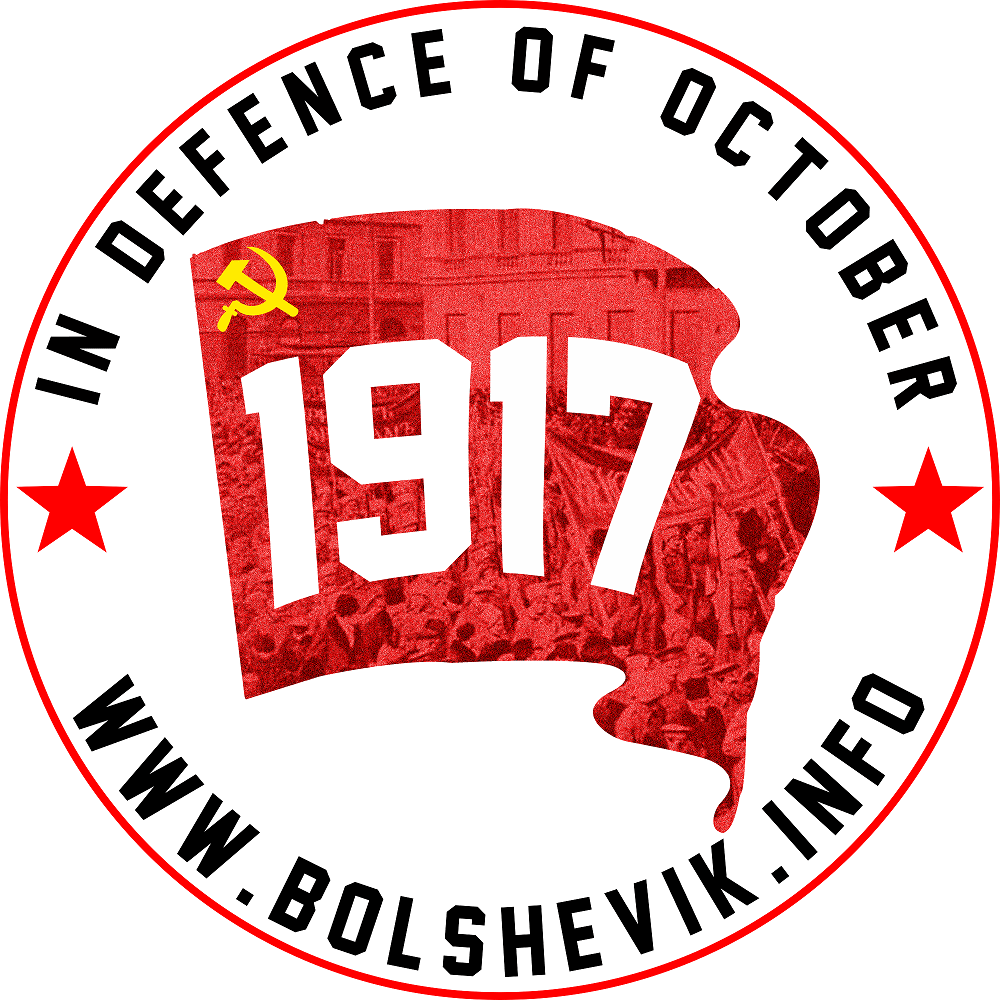 This article contains Lenin’s famous April Theses, read by him at two meetings of the All-Russia Conference of Soviets of Workers’ and Soldiers’ Deputies, on April 4, 1917. Published April 7, 1917 in Pravda No. 26. Signed: N. Lenin. All dates cited by Lenin are in the old Julian calendar.
This article contains Lenin’s famous April Theses, read by him at two meetings of the All-Russia Conference of Soviets of Workers’ and Soldiers’ Deputies, on April 4, 1917. Published April 7, 1917 in Pravda No. 26. Signed: N. Lenin. All dates cited by Lenin are in the old Julian calendar.
I did not arrive in Petrograd until the night of April 3, and therefore at the meeting on April 4, I could, of course, deliver the report on the tasks of the revolutionary proletariat only on my own behalf, and with reservations as to insufficient preparation.
The only thing I could do to make things easier for myself—and for honest opponents—was to prepare the theses in writing. I read them out, and gave the text to Comrade Tsereteli. I read them twice very slowly: first at a meeting of Bolsheviks and then at a meeting of both Bolsheviks and Mensheviks.
I publish these personal theses of mine with only the briefest explanatory notes, which were developed in far greater detail in the report.
Theses
1) In our attitude towards the war, which under the new [provisional] government of Lvov and Co. unquestionably remains on Russia’s part a predatory imperialist war owing to the capitalist nature of that government, not the slightest concession to “revolutionary defencism” is permissible.
The class-conscious proletariat can give its consent to a revolutionary war, which would really justify revolutionary defencism, only on condition: (a) that the power pass to the proletariat and the poorest sections of the peasants aligned with the proletariat; (b) that all annexations be renounced in deed and not in word; (c) that a complete break be effected in actual fact with all capitalist interests.
In view of the undoubted honesty of those broad sections of the mass believers in revolutionary defencism who accept the war only as a necessity, and not as a means of conquest, in view of the fact that they are being deceived by the bourgeoisie, it is necessary with particular thoroughness, persistence and patience to explain their error to them, to explain the inseparable connection existing between capital and the imperialist war, and to prove that without overthrowing capital it is impossible to end the war by a truly democratic peace, a peace not imposed by violence.
The most widespread campaign for this view must be organised in the army at the front.
Fraternisation.
2) The specific feature of the present situation in Russia is that the country is passing from the first stage of the revolution—which, owing to the insufficient class-consciousness and organisation of the proletariat, placed power in the hands of the bourgeoisie—to its second stage, which must place power in the hands of the proletariat and the poorest sections of the peasants.
This transition is characterised, on the one hand, by a maximum of legally recognised rights (Russia is now the freest of all the belligerent countries in the world); on the other, by the absence of violence towards the masses, and, finally, by their unreasoning trust in the government of capitalists, those worst enemies of peace and socialism.
This peculiar situation demands of us an ability to adapt ourselves to the special conditions of Party work among unprecedentedly large masses of proletarians who have just awakened to political life.
3) No support for the Provisional Government; the utter falsity of all its promises should be made clear, particularly of those relating to the renunciation of annexations. Exposure in place of the impermissible, illusion-breeding “demand” that this government, a government of capitalists, should cease to be an imperialist government.
4) Recognition of the fact that in most of the Soviets of Workers’ Deputies our Party is in a minority, so far a small minority, as against a bloc of all the petty-bourgeois opportunist elements, from the Popular Socialists and the Socialist-Revolutionaries down to the Organising Committee (Chkheidze, Tsereteli, etc.), Steklov, etc., etc., who have yielded to the influence of the bourgeoisie and spread that influence among the proletariat.
The masses must be made to see that the Soviets of Workers’ Deputies are the only possible form of revolutionary government, and that therefore our task is, as long as this government yields to the influence of the bourgeoisie, to present a patient, systematic, and persistent explanation of the errors of their tactics, an explanation especially adapted to the practical needs of the masses.
As long as we are in the minority we carry on the work of criticising and exposing errors and at the same time we preach the necessity of transferring the entire state power to the Soviets of Workers’ Deputies, so that the people may overcome their mistakes by experience.
5) Not a parliamentary republic—to return to a parliamentary republic from the Soviets of Workers’ Deputies would be a retrograde step—but a republic of Soviets of Workers’, Agricultural Labourers’ and Peasants’ Deputies throughout the country, from top to bottom.
Abolition of the police, the army and the bureaucracy.
The salaries of all officials, all of whom are elective and displaceable at any time, not to exceed the average wage of a competent worker.
6) The weight of emphasis in the agrarian programme to be shifted to the Soviets of Agricultural Labourers’ Deputies.
Confiscation of all landed estates.
Nationalisation of all lands in the country, the land to be disposed of by the local Soviets of Agricultural Labourers’ and Peasants’ Deputies. The organisation of separate Soviets of Deputies of Poor Peasants. The setting up of a model farm on each of the large estates (ranging in size from 100 to 300 dessiatines, according to local and other conditions, and to the decisions of the local bodies) under the control of the Soviets of Agricultural Labourers’ Deputies and for the public account.
7) The immediate union of all banks in the country into a single national bank, and the institution of control over it by the Soviet of Workers’ Deputies.
8) It is not our immediate task to “introduce” socialism, but only to bring social production and the distribution of products at once under the control of the Soviets of Workers’ Deputies.
9) Party tasks:
(a) Immediate convocation of a Party congress;
(b) Alteration of the Party Programme, mainly:
- On the question of imperialism and the imperialist war,
- On our attitude towards the state and our demand for a “commune state”;
- Amendment of our out-of-date minimum programme;
(c) Change of the Party’s name.
10. A new International.
We must take the initiative in creating a revolutionary International, an International against the social-chauvinists and against the “Centre”.
In order that the reader may understand why I had especially to emphasise as a rare exception the “case” of honest opponents, I invite him to compare the above theses with the following objection by Mr. Goldenberg: Lenin, he said, “has planted the banner of civil war in the midst of revolutionary democracy” (quoted in No. 5 of Mr. Plekhanov’s Yedinstvo).
Isn’t it a gem?
I write, announce and elaborately explain: “In view of the undoubted honesty of those broad sections of the mass believers in revolutionary defencism … in view of the fact that they are being deceived by the bourgeoisie, it is necessary with particular thoroughness, persistence and patience to explain their error to them….”
Yet the bourgeois gentlemen who call themselves Social-Democrats, who do not belong either to the broad sections or to the mass believers in defencism, with serene brow present my views thus: “The banner[!] of civil war” (of which there is not a word in the theses and not a word in my speech!) has been planted(!) “in the midst [!!] of revolutionary democracy…”.
What does this mean? In what way does this differ from riot-inciting agitation, from Russkaya Volya?
I write, announce and elaborately explain: “The Soviets of Workers’ Deputies are the only possible form of revolutionary government, and therefore our task is to present a patient, systematic, and persistent explanation of the errors of their tactics, an explanation especially adapted to the practical needs of the masses.”
Yet opponents of a certain brand present my views as a call to “civil war in the midst of revolutionary democracy”!
I attacked the Provisional Government for not having appointed an early date or any date at all, for the convocation of the Constituent Assembly, and for confining itself to promises. I argued that without the Soviets of Workers’ and Soldiers’ Deputies the convocation of the Constituent Assembly is not guaranteed and its success is impossible.
And the view is attributed to me that I am opposed to the speedy convocation of the Constituent Assembly!
I would call this “raving”, had not decades of political struggle taught me to regard honesty in opponents as a rare exception.
Mr. Plekhanov in his paper called my speech “raving”. Very good, Mr. Plekhanov! But look how awkward, uncouth and slow-witted you are in your polemics. If I delivered a raving speech for two hours, how is it that an audience of hundreds tolerated this “raving”? Further, why does your paper devote a whole column to an account of the “raving”? Inconsistent, highly inconsistent!
It is, of course, much easier to shout, abuse, and howl than to attempt to relate, to explain, to recall what Marx and Engels said in 1871, 1872 and 1875 about the experience of the Paris Commune and about the kind of state the proletariat needs. [See: The Civil War in France and Critique of the Gotha Programme]
Ex-Marxist Mr. Plekhanov evidently does not care to recall Marxism.
I quoted the words of Rosa Luxemburg, who on August 4, 1914, called German Social-Democracy a “stinking corpse”. And the Plekhanovs, Goldenbergs and Co. feel “offended”. On whose behalf? On behalf of the German chauvinists, because they were called chauvinists!
They have got themselves in a mess, these poor Russian social-chauvinists—socialists in word and chauvinists in deed.

